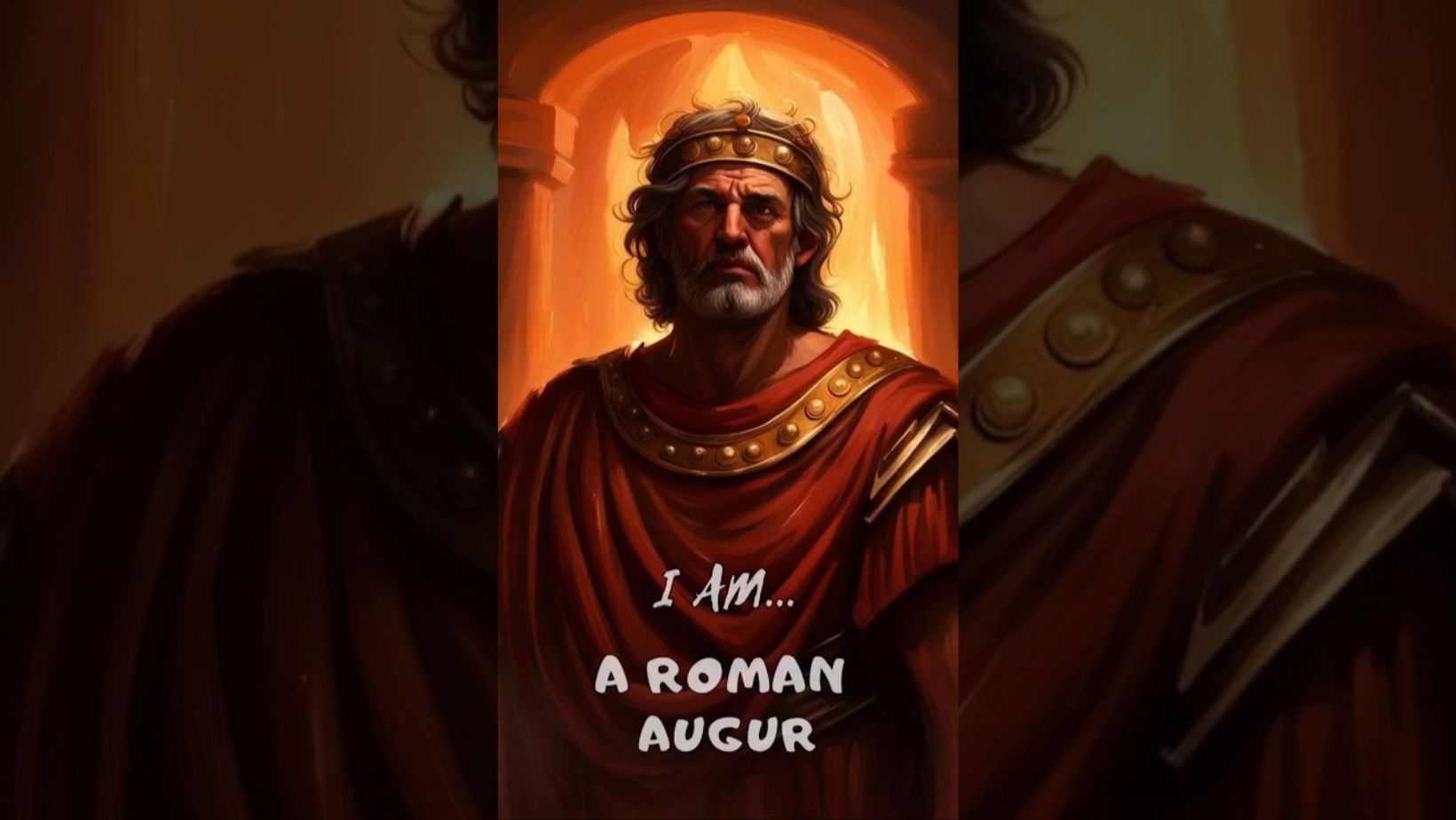Step back in time to ancient Rome, where the whispers of the gods held the power to shape the fate of an empire. In this captivating journey, we’ll unravel the mysteries of augurs and Roman divination, shedding light on the sacred rituals and profound beliefs that guided the lives of Romans for centuries.
Imagine a world where the flight of birds, the rumble of thunder, and the flickering of lightning held divine messages. That was the reality for the augurs, the revered priests who possessed the gift of interpreting these signs from the heavens. Their wisdom and insight were sought by emperors, generals, and common folk alike, for the augurs held the key to unlocking the will of the gods.
Table Of Contents:
- What Are Augurs in Ancient Roman Divination?
- The Art of Augury: Augurs, Auguria, and Auspices
- Famous Augurs in Roman History: Attus Navius
- The Significance of Birds in Roman Augury
- The Role of Augurs in Roman Society and Politics
- Conclusion
What Are Augurs in Ancient Roman Divination?

Have you ever wondered how the ancient Romans made important decisions? They didn’t have polls or focus groups back then. Instead, they turned to augurs – religious officials who interpreted signs from the gods.
Etymology of the Term Augur: Augurs and Roman Divination
The word “augur” comes from the Latin verb “augere,” which means “to increase or augment.” Augurs were believed to have the power to interpret divine will and guide human actions accordingly. They were the go-to guys for all things related to Roman religion and divination.
History and Public Role of Augurs
Augurs were one of the four major priestly colleges in ancient Rome, along with the pontiffs, the decemviri sacris faciundis, and the epulones. They played a crucial role in Roman society and politics. No major decision was made without consulting the augurs first.
Imagine you’re a Roman general about to embark on a military campaign. You wouldn’t dare leave without getting the thumbs up from the augurs. They were like the ancient equivalent of a green light from the gods.
Augurs in the Kingdom of Rome
The origins of the augurs go way back to the early days of Rome. According to legend, Romulus himself appointed the first augurs. There were only three of them at first, representing the three ancient tribes of Rome. But as the city grew, so did the number of augurs.
Augurs in the Roman Republic
By the time of the Roman Republic, the college of augurs had expanded to nine members. It was a prestigious gig, reserved mostly for the patrician class. That is, until the Lex Ogulnia came along in 300 BCE and opened up the doors for plebeians to join the club.
Some famous augurs from the Republic include Appius Claudius Pulcher and Cicero. Yeah, that Cicero – the guy known for his oratory skills and philosophical writings. Turns out he was also an augur.
Augurs in the Roman Empire
The augurs continued to hold sway even during the Roman Empire, though their influence started to wane as the emperors consolidated power. Still, the college of augurs existed well into the 4th century CE. The last known augur was a guy named Petronius Apollodorus, who served under Emperor Theodosius I.
So there you have it – a crash course on augurs in ancient Roman divination. These guys were the real deal when it came to interpreting the will of the gods. They may not have had Twitter or Instagram, but they sure knew how to read the signs.
The Art of Augury: Augurs, Auguria, and Auspices
Now that we know who the augurs were, let’s dive into what they actually did. The art of augury was all about interpreting signs from the gods, also known as auspices. This was serious business in ancient Rome.
Ancient Tradition of Augury: Augurs and Roman Divination
The Romans didn’t invent augury – they actually borrowed it from the Etruscans. But they took it to a whole new level. Augury became a fundamental part of Roman religion and daily life.
Augurs were said to have a direct line to the gods. They could read the divine will through signs in nature, like the flight of birds or the sound of thunder. It was like a sacred code that only they could decipher.
Categories of Augury
There were five main types of augury: ex caelo (from the sky), ex avibus (from birds), ex tripudiis (from the feeding of sacred chickens), ex quadrupedibus (from four-footed animals), and ex diris (from portents and prodigies).
The most important of these were the auspices taken from the flight of birds. Different birds had different meanings. For example, eagles were associated with Jupiter and always meant good news. Owls, on the other hand, were usually a bad omen.
Precedence of Augury
Augury wasn’t just a formality – it was a legal requirement. No public act, whether civil or military, could happen without taking the auspices first. The augurs had the power to delay or cancel assemblies if the omens weren’t favorable.
Even if a decision had already been made, an augur could swoop in and declare it invalid if he thought the gods weren’t happy about it. Talk about a veto power.
Famous Augurs in Roman History: Attus Navius

One of the most legendary augurs in Roman history was a guy named Attus Navius. He lived way back in the time of King Tarquinius Priscus, the fifth king of Rome.
The story goes that Tarquinius wanted to make some changes to the Roman cavalry. But Navius was like, “Not so fast, your highness. We gotta check with the gods first.”
The king was skeptical and decided to put Navius to the test. He asked him if what he was thinking could be done. Navius did his augury thing and said, “Yep, it can be done.”
Turns out, Tarquinius was thinking of cutting a whetstone with a razor. He figured there was no way Navius could’ve known that. But lo and behold, Navius took the razor and sliced that whetstone clean in half.
From that day on, no one dared to question the power of the augurs. Navius became a legend, and the Capitoline Hill even had a statue of him and his razor-cut whetstone.
The Significance of Birds in Roman Augury: Augurs and Roman Divination
As we’ve seen, birds were a big deal in Roman augury. Different species had different meanings, and augurs paid close attention to their behavior and flight patterns.
Eagles, known as jovis ales or “Jupiter’s bird,” were always a good sign. They represented the king of the gods and were associated with victory and power.
Another important bird was the woodpecker, or picus martius. This little guy was sacred to Mars, the god of war. Seeing a woodpecker before battle was a surefire sign of success.
But perhaps the most famous birds in Roman augury were the sacred chickens. These weren’t your average barnyard fowl – they had a very special job.
Before any major undertaking, the augurs would present the sacred chickens with food. If the chickens ate greedily, letting bits of food fall from their beaks, it was a good omen. But if they refused to eat or flew away, it was a bad sign. Augurs and Roman Divination.
In fact, there’s a story about a Roman general named Publius Claudius Pulcher who ignored the sacred chickens before a naval battle. When they refused to eat, he supposedly threw them overboard, saying, “If they won’t eat, let them drink.” Needless to say, he lost the battle.
The Role of Augurs in Roman Society and Politics: Augurs and Roman Divination
Augurs weren’t just religious figures – they were deeply embedded in Roman society and politics. Their influence extended to every aspect of public life.
No major decision was made domo militiaeque – at home or in the field – without consulting the augurs. They were present at the founding of cities, the declaration of war, and the election of magistrates.
In fact, the phrase auspiciis bello ac pace – “under the auspices of war and peace” – was a common way of referring to the augurs’ role in military and civil affairs.
The augurs also had the power to adjourn or postpone assemblies if the omens were unfavorable. This gave them a lot of political clout. They could effectively veto any decision they didn’t like. Augurs and Roman Divination.
As Cicero famously said, “Quis est, qui ignoret, omnia re publica auspiciis geri?” – “Who is there who does not know that all public affairs are conducted under the auspices?”
In other words, the augurs weren’t just interpreting the will of the gods – they were shaping the very fabric of Roman society. They may not have held elected office, but they were among the most powerful and influential people in ancient Rome.
So the next time you hear someone say “the auspices are good,” remember the augurs and their sacred duty to guide the Roman state. They may be long gone, but their legacy lives on in our language and our fascination with the mysteries of divination.
Key Takeaway: Augurs and Roman Divination
Augurs and Roman Divination. Ancient Romans relied on augurs to interpret signs from the gods for major decisions. These officials read omens, often through birds’ behavior, guiding public and military actions. Augury wasn’t just tradition; it was legally essential in Rome’s society and politics.
Conclusion: Augurs and Roman Divination
Augurs and Roman divination were more than mere superstition; they were a fundamental pillar of Roman society, shaping decisions, guiding actions, and providing a sense of order in an uncertain world. The art of divination, with its intricate rituals and profound symbolism, offers a fascinating glimpse into the mindset and beliefs of the ancient Romans.
Through the lens of the augurs, we see a civilization deeply connected to the divine, where every aspect of life was intertwined with the will of the gods. The legacy of Roman divination endures to this day, reminding us of the timeless human desire to seek guidance, find meaning, and navigate the complexities of existence.
So the next time you find yourself gazing at the sky, remember the augurs of old and the profound wisdom they sought in the signs from above. Who knows? Maybe the gods have a message for you too.

